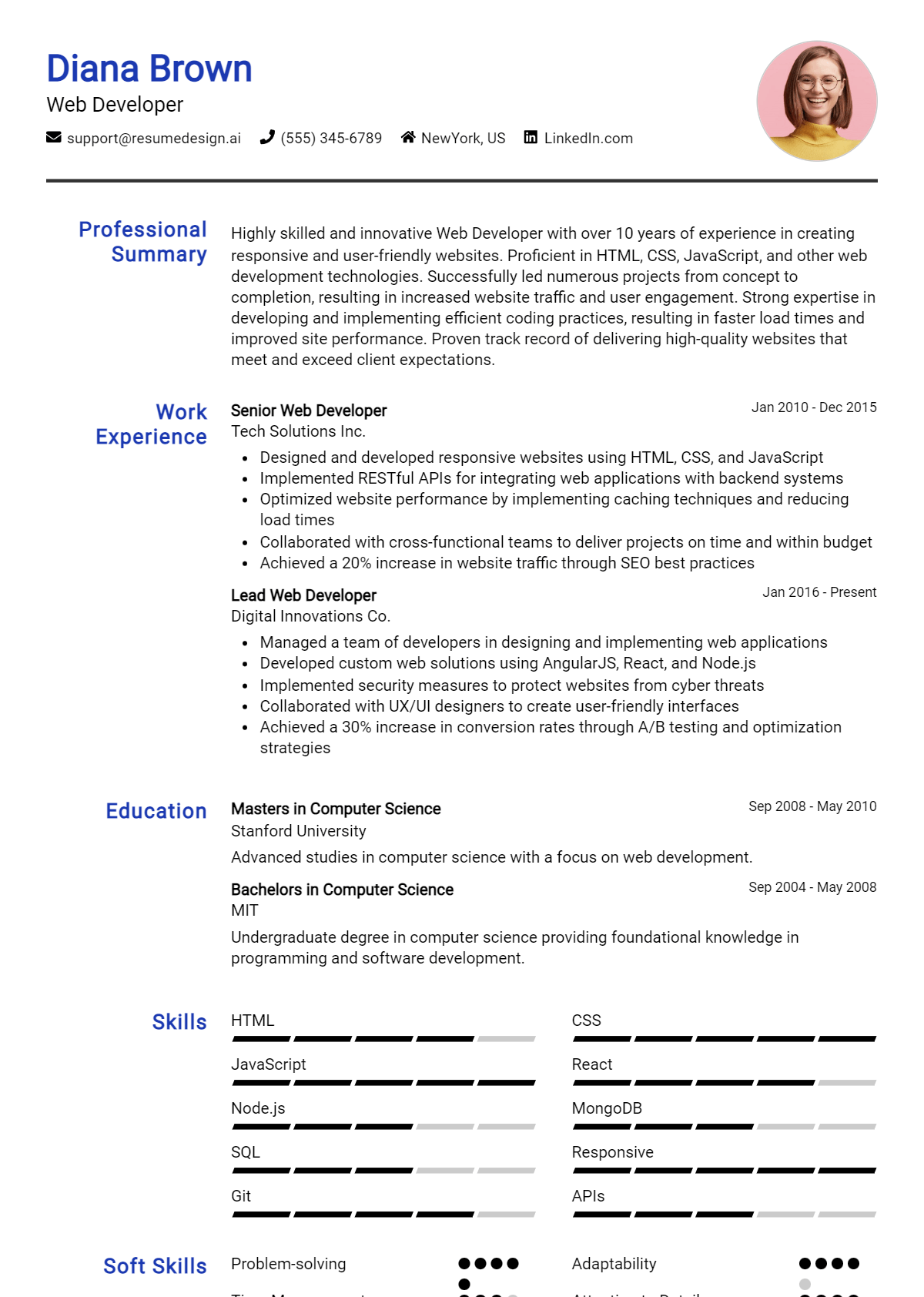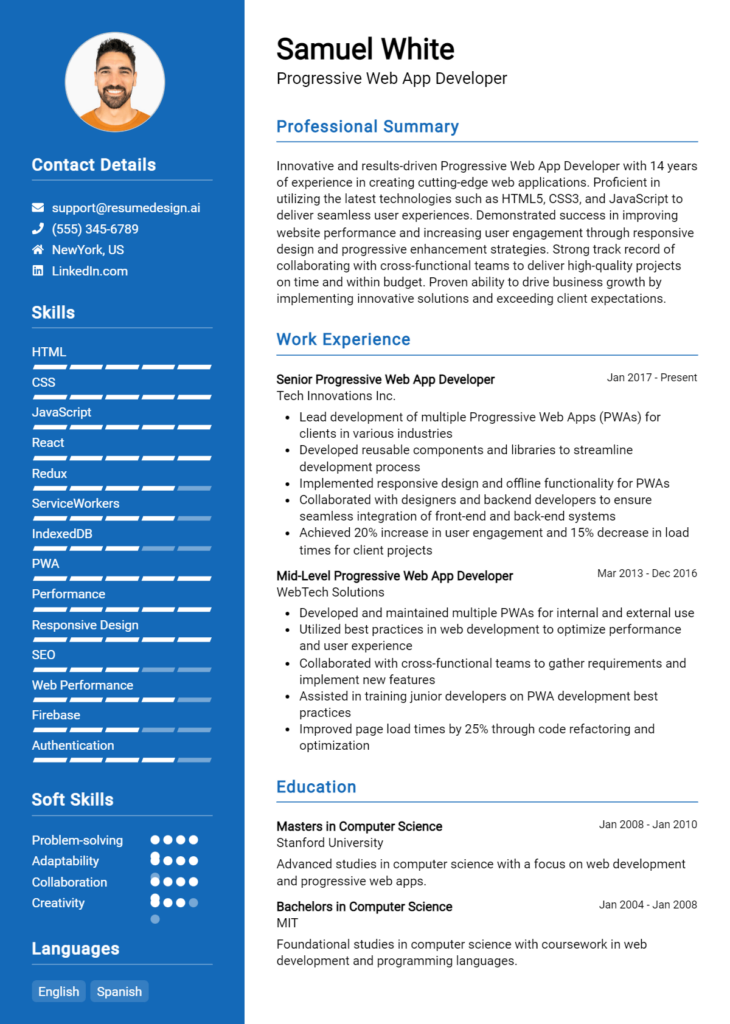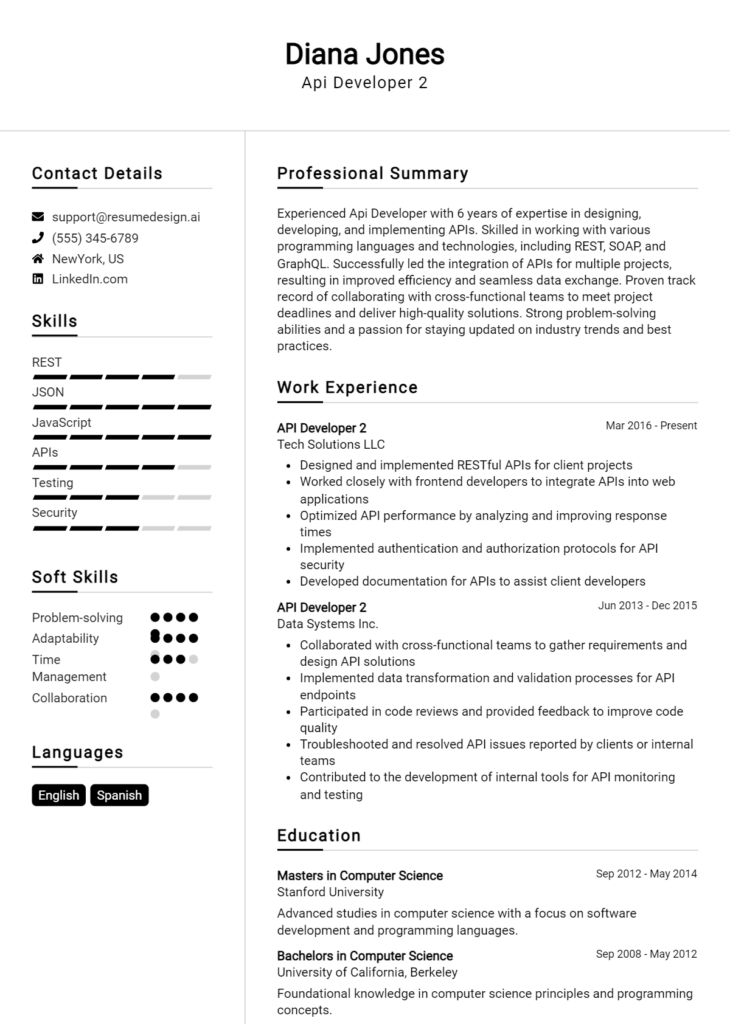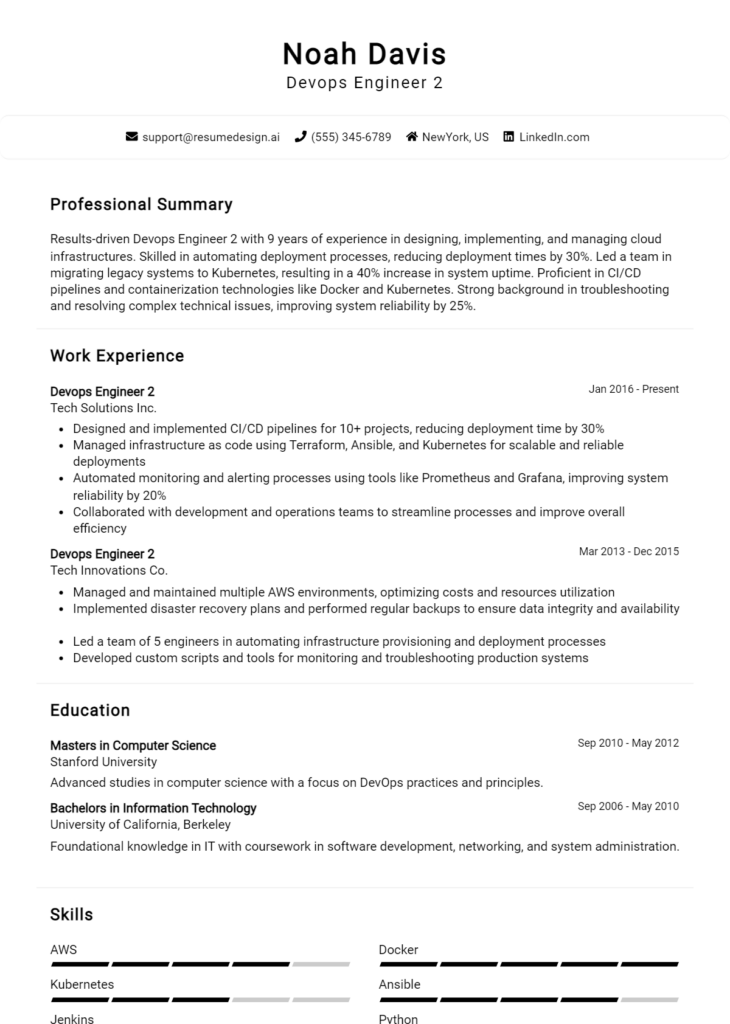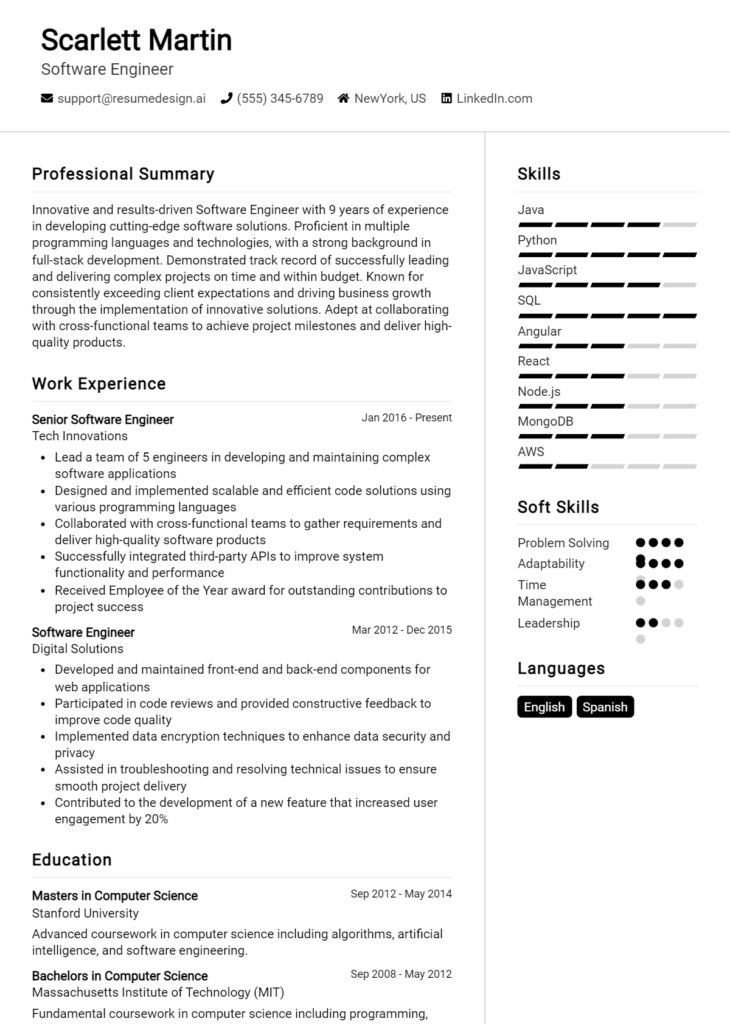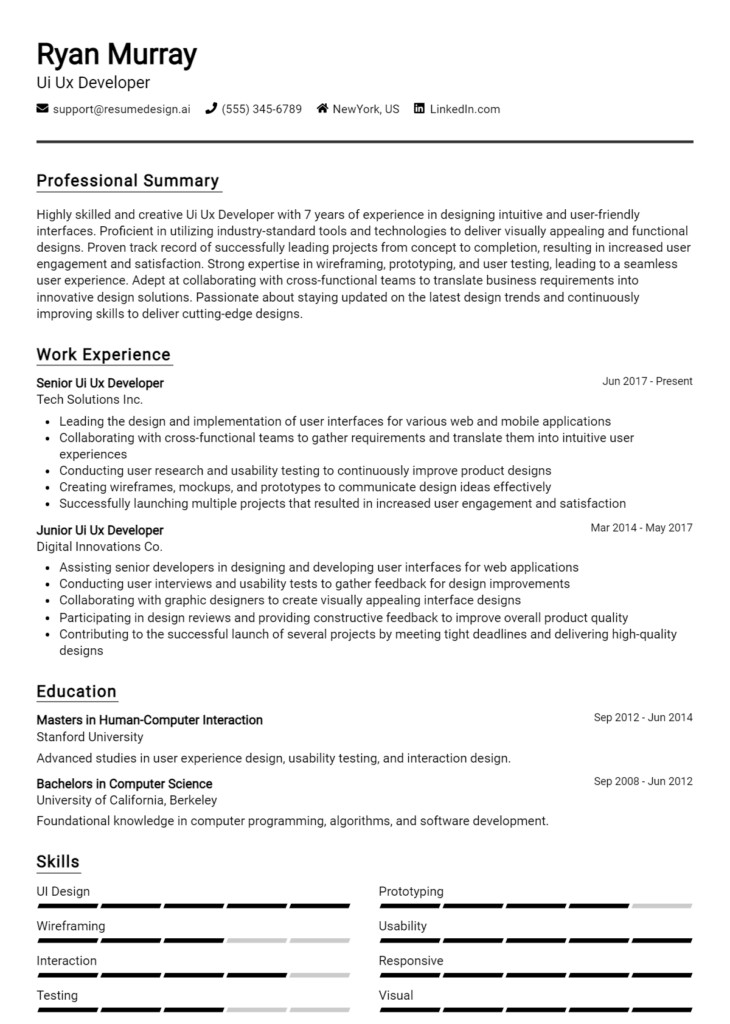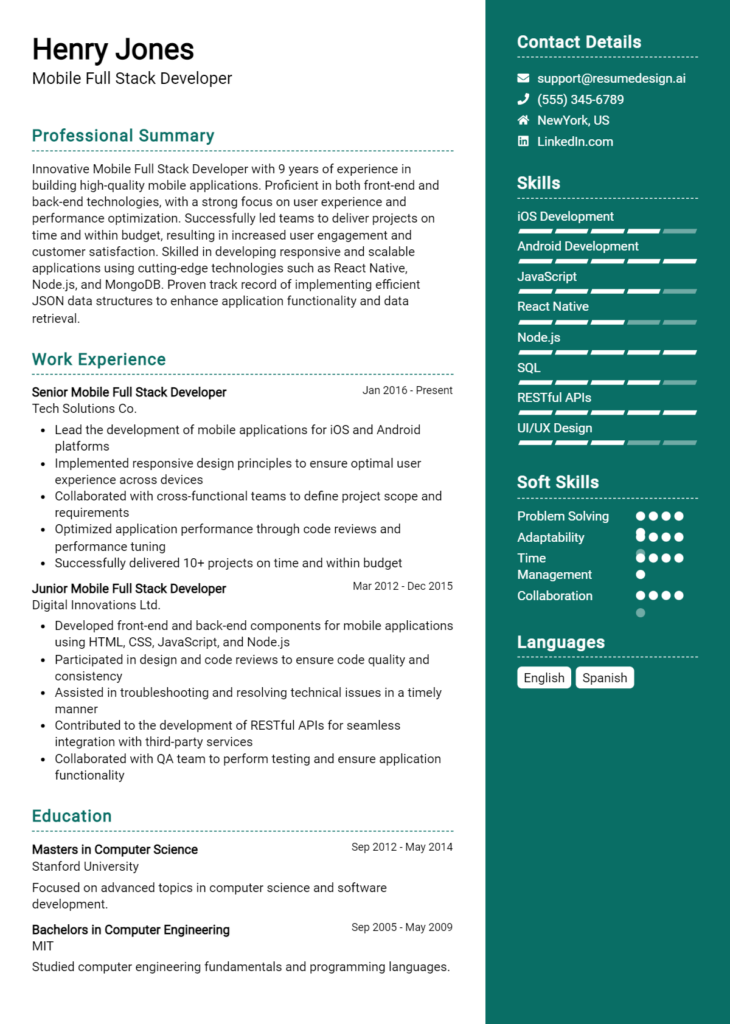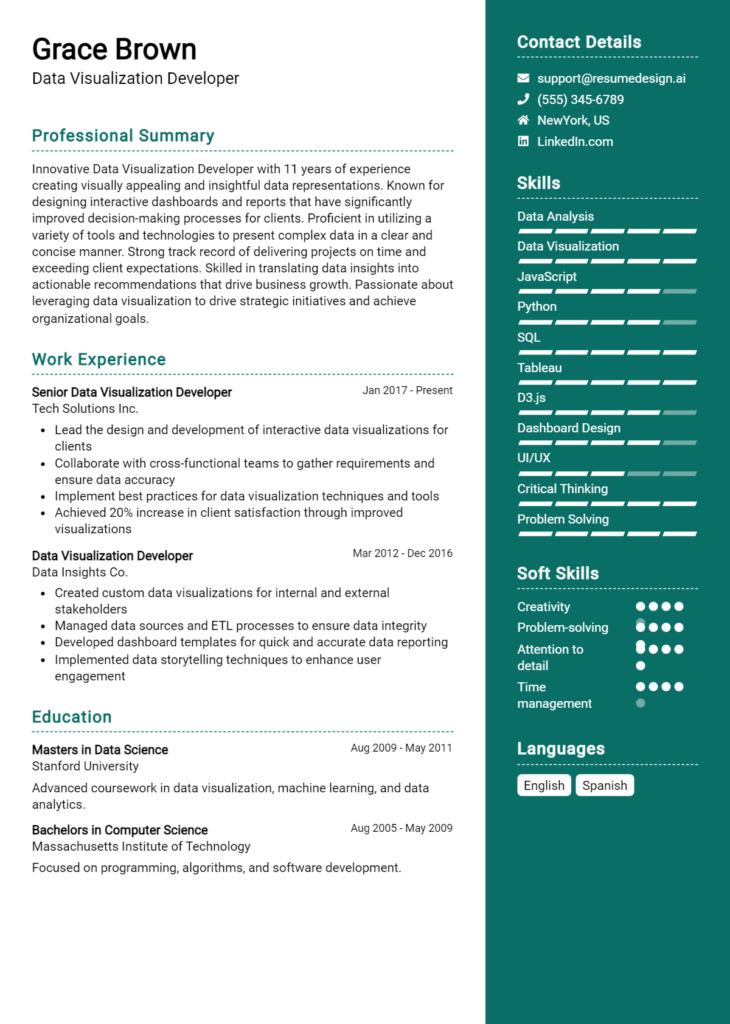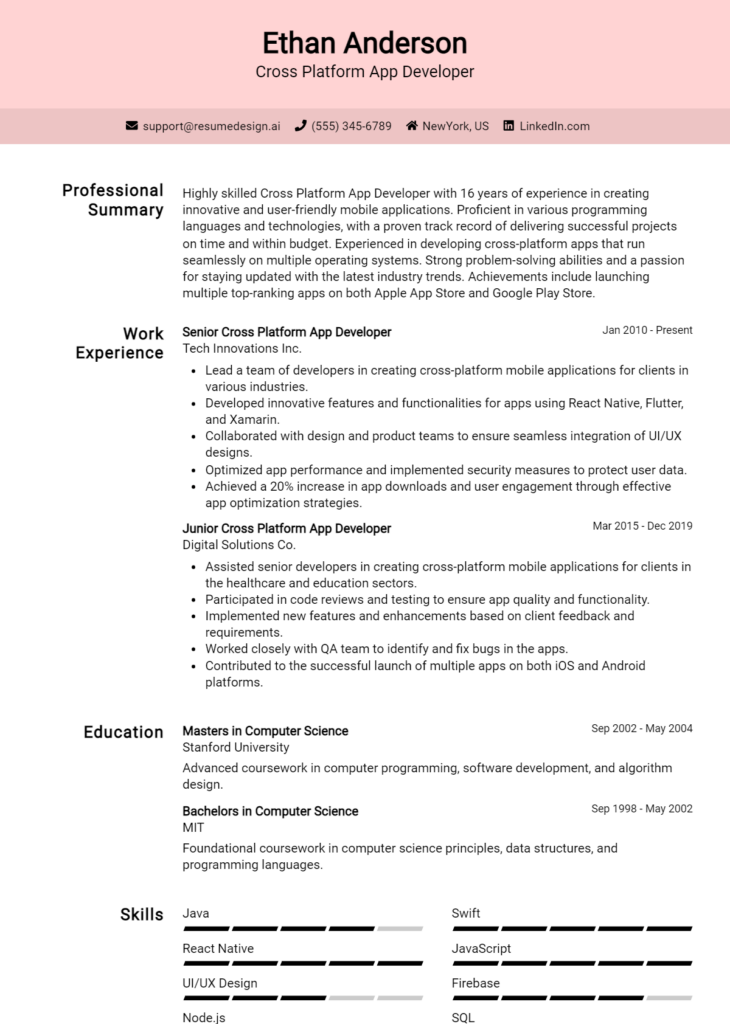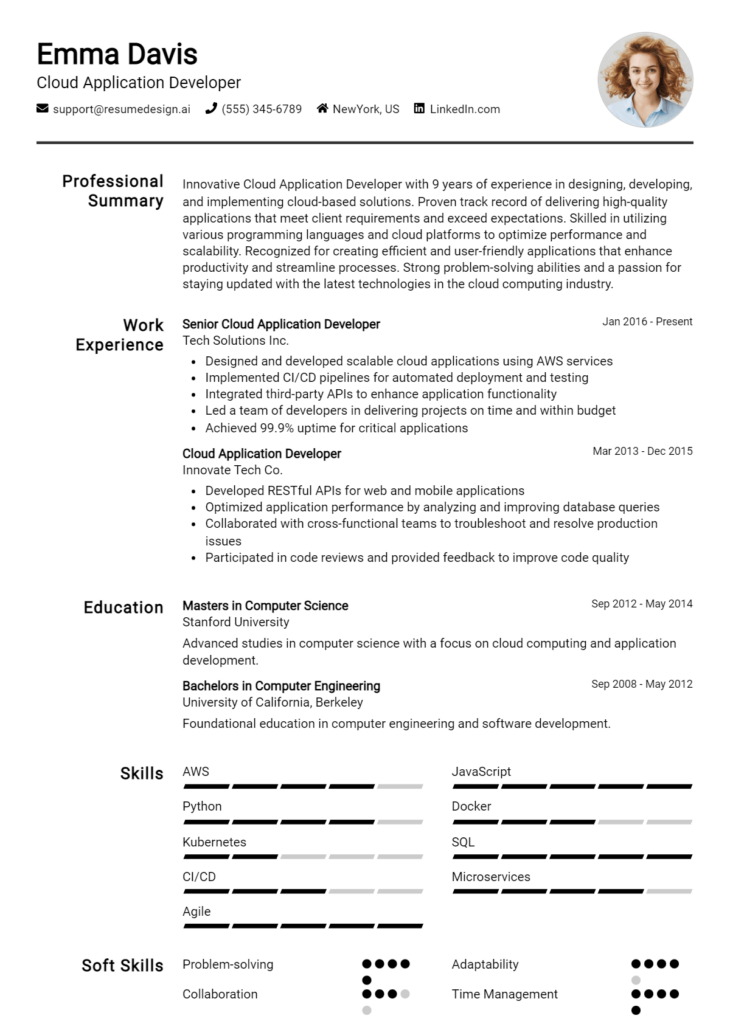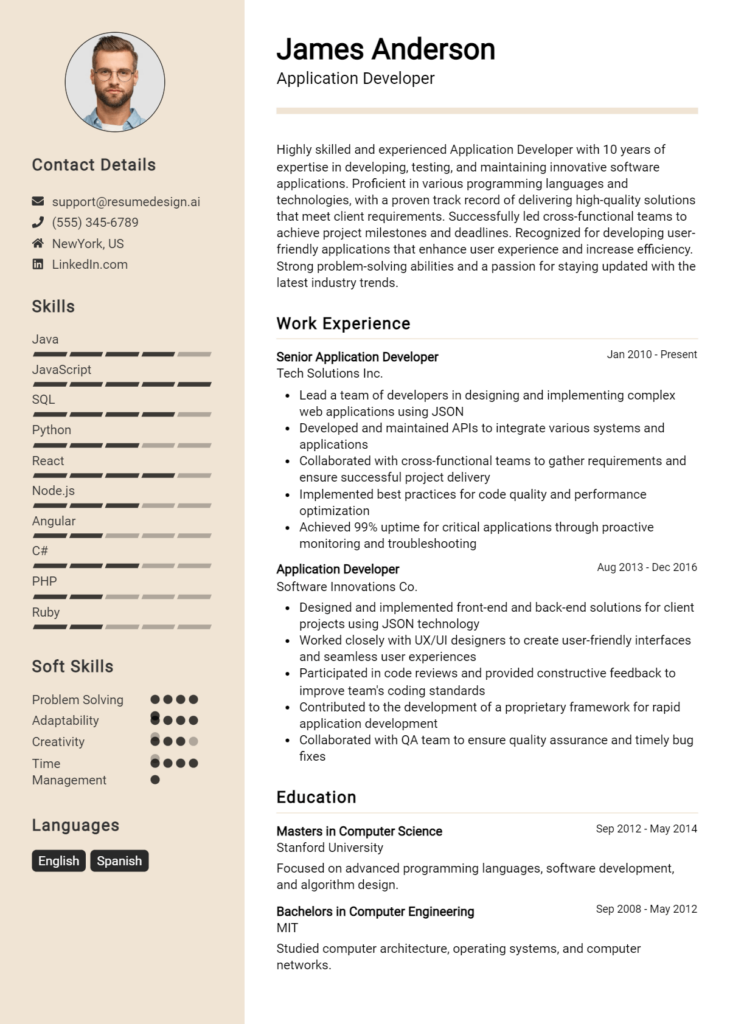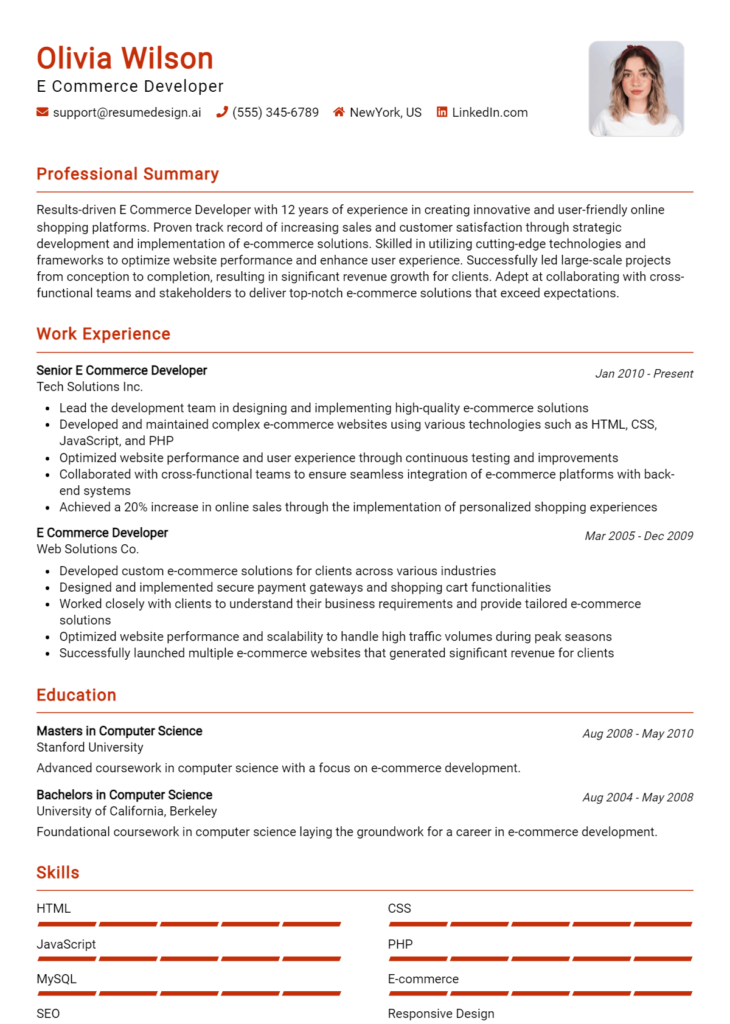Web Developer Core Responsibilities
A Web Developer plays a crucial role in creating and maintaining websites, requiring a blend of technical skills, operational understanding, and problem-solving abilities. This professional connects various departments, ensuring seamless collaboration between design, content, and functionality. Key skills include proficiency in programming languages, knowledge of web frameworks, and an understanding of user experience. A well-crafted resume that highlights these capabilities is essential for demonstrating how they contribute to the organization's overall goals and success.
Common Responsibilities Listed on Web Developer Resume
- Designing and implementing website layout and user interface
- Writing clean, maintainable, and efficient code
- Collaborating with graphic designers and content creators
- Testing and debugging web applications for optimal performance
- Maintaining and updating existing websites
- Ensuring cross-platform compatibility and mobile responsiveness
- Integrating third-party services and APIs
- Optimizing websites for SEO and performance
- Implementing security measures to protect data
- Staying updated with industry trends and technologies
- Documenting processes and code for future reference
High-Level Resume Tips for Web Developer Professionals
A well-crafted resume is a crucial tool for Web Developer professionals, serving as the first impression made on potential employers. In a competitive job market, your resume needs to not only reflect your technical skills but also showcase your achievements and unique qualifications. It acts as your personal marketing document, highlighting your ability to create innovative solutions and effectively communicate your experience. This guide will provide practical and actionable resume tips specifically tailored for Web Developer professionals, ensuring you stand out in the applicant pool.
Top Resume Tips for Web Developer Professionals
- Tailor your resume to the job description by incorporating relevant keywords and phrases from the posting.
- Showcase your relevant experience prominently, including internships, freelance work, and personal projects.
- Quantify your achievements by using metrics, such as improved website load times or increased user engagement.
- Highlight industry-specific skills such as proficiency in programming languages (e.g., JavaScript, Python) and frameworks (e.g., React, Angular).
- Include a portfolio link to showcase your best work and demonstrate your coding capabilities and design aesthetics.
- Use clean, professional formatting to ensure readability and create a visually appealing layout.
- List certifications or courses relevant to web development to showcase your commitment to ongoing education.
- Incorporate a brief summary at the top of your resume that encapsulates your core strengths and career objectives.
- Keep your resume concise, ideally one page, focusing on the most pertinent information.
- Proofread thoroughly to eliminate any errors in spelling, grammar, or formatting that could detract from your professionalism.
By implementing these tips, you can significantly increase your chances of landing a job in the Web Developer field. A well-optimized resume will not only highlight your skills and experiences but also demonstrate your commitment to excellence and attention to detail, qualities that potential employers value highly.
Why Resume Headlines & Titles are Important for Web Developer
In the competitive field of web development, a well-crafted resume headline or title plays a crucial role in capturing the attention of hiring managers. A strong headline serves as the first impression, summarizing a candidate's key qualifications in a concise and impactful phrase. It should resonate with the specific job being applied for, highlighting relevant skills or experiences that align with the position. An effective headline can differentiate a candidate from the myriad of applicants, making it essential for web developers to focus on crafting a title that is not only relevant but also compelling.
Best Practices for Crafting Resume Headlines for Web Developer
- Keep it concise: Aim for a headline that is brief but informative, ideally one to two lines long.
- Be role-specific: Tailor the headline to match the specific job title and requirements of the position being applied for.
- Highlight key skills: Incorporate essential skills or technologies relevant to web development, such as HTML, CSS, JavaScript, or frameworks.
- Showcase accomplishments: If possible, include a notable achievement that speaks to your expertise or contributions in previous roles.
- Use impactful language: Choose strong action verbs and descriptive adjectives to convey your strengths and capabilities effectively.
- Avoid jargon: While technical terms can be important, ensure that the headline remains clear and understandable to a broad audience.
- Make it unique: Stand out by personalizing your headline to reflect your unique value and perspective as a web developer.
- Update regularly: Revise your headline as you gain new skills or experiences to keep it current and relevant.
Example Resume Headlines for Web Developer
Strong Resume Headlines
"Full-Stack Web Developer Specializing in Responsive Design and User Experience"
“Creative Front-End Developer with 5+ Years of Experience in JavaScript Frameworks”
“Results-Driven Web Developer with Proven Track Record in E-Commerce Solutions”
Weak Resume Headlines
“Web Developer”
“Experienced in Web Development”
Strong headlines are effective because they immediately convey the candidate's expertise and area of specialization, making a memorable impression on hiring managers. They utilize specific terminology and accomplishments that demonstrate a value proposition. In contrast, weak headlines fail to impress due to their vagueness and lack of detail; they do not provide the reader with any clear indication of the candidate’s unique skills or contributions, ultimately blending into the sea of generic applications.
Writing an Exceptional Web Developer Resume Summary
In the competitive field of web development, a well-crafted resume summary is essential for capturing the attention of hiring managers. This brief yet impactful introduction serves as the first impression of a candidate's qualifications, showcasing key skills, relevant experience, and notable accomplishments. A strong resume summary can quickly communicate a candidate's fit for the role, making it easier for hiring managers to see the value they would bring to the team. It should be concise, tailored to the specific job description, and designed to highlight what sets the candidate apart from others in the field.
Best Practices for Writing a Web Developer Resume Summary
- Quantify achievements to demonstrate impact, such as "Increased site traffic by 40% through effective SEO strategies."
- Focus on relevant skills that align with the job description, such as proficiency in HTML, CSS, JavaScript, and frameworks like React or Angular.
- Tailor the summary for the specific job by incorporating keywords found in the job posting.
- Highlight unique accomplishments or projects that showcase problem-solving abilities and technical expertise.
- Keep the summary concise, ideally between 2-4 sentences, to maintain the reader's attention.
- Use active language and strong verbs to convey confidence and a proactive mindset.
- Include any certifications or specialized training relevant to web development.
- Avoid jargon or overly technical language that may alienate non-technical hiring managers.
Example Web Developer Resume Summaries
Strong Resume Summaries
Results-driven web developer with over 5 years of experience in building responsive and user-friendly websites. Expertise in JavaScript, React, and PHP, with a proven track record of increasing client engagement by 30% through innovative design solutions.
Detail-oriented web developer skilled in full-stack development, specializing in MERN stack applications. Successfully led a team project that reduced loading times by 50%, enhancing user experience and boosting customer satisfaction ratings.
Creative web developer with a passion for crafting intuitive web applications. Developed an e-commerce platform that generated $200,000 in sales within the first six months, utilizing advanced SEO techniques and performance optimization.
Weak Resume Summaries
Web developer with some experience. I work with various technologies and can build websites.
I am a web developer looking for a job. I have skills in coding and design but not much experience.
The examples above illustrate the differences between strong and weak resume summaries. Strong summaries effectively highlight specific skills, quantify achievements, and convey relevant experiences that directly relate to the job role. In contrast, weak summaries lack specificity and do not provide measurable outcomes or a clear picture of the candidate’s capabilities, making them less compelling to hiring managers.
Work Experience Section for Web Developer Resume
The work experience section of a Web Developer resume is a critical component that allows candidates to demonstrate their technical skills and professional journey. This section not only showcases the candidate's ability to develop and implement web applications, but it also highlights their capacity to manage teams, collaborate with stakeholders, and deliver high-quality products on time. By quantifying achievements and aligning their experience with industry standards, candidates can effectively convey their value to potential employers, making it essential to craft this section thoughtfully and strategically.
Best Practices for Web Developer Work Experience
- Focus on relevant technical skills and tools used in previous roles.
- Quantify achievements with metrics, such as increased site traffic or reduced load times.
- Highlight specific projects that showcase your problem-solving abilities.
- Emphasize collaboration with cross-functional teams to deliver successful products.
- Use action verbs to convey impact and engagement in your roles.
- Align your experience with industry standards and expectations for web development.
- Include a mix of full-time roles, freelance projects, and internships to demonstrate a breadth of experience.
- Tailor your work experience to match the job description of the position you are applying for.
Example Work Experiences for Web Developer
Strong Experiences
- Led a team of 5 developers to create a responsive e-commerce website, resulting in a 30% increase in online sales within six months.
- Implemented a new content management system that improved site loading speed by 40%, enhancing user experience and SEO rankings.
- Collaborated with UX/UI designers to revamp the interface of a web application, increasing user engagement by 50% as measured by session duration.
- Developed and maintained a web application for a non-profit organization, reducing operational costs by 25% through automation of manual processes.
Weak Experiences
- Worked on various web projects.
- Responsible for debugging issues on websites.
- Participated in team meetings about website features.
- Helped with coding and other tasks as needed.
The examples provided illustrate the difference between strong and weak work experiences. Strong experiences are characterized by clear, quantifiable outcomes, technical leadership, and explicit collaboration, which effectively demonstrate the candidate's impact and contributions. In contrast, weak experiences lack detail and specificity, making it challenging for potential employers to gauge the candidate's actual abilities or accomplishments. By focusing on measurable results and meaningful contributions, candidates can significantly enhance their resumes and stand out in the competitive web development field.
Education and Certifications Section for Web Developer Resume
The education and certifications section of a Web Developer resume is crucial for showcasing a candidate's academic background and professional qualifications. This section not only highlights formal education but also emphasizes industry-relevant certifications, which can profoundly impact a hiring manager's perception of the applicant. By including relevant coursework, certifications, and specialized training, candidates can demonstrate their commitment to continuous learning and their alignment with the evolving demands of the web development industry. A well-crafted education and certifications section can greatly enhance a candidate's credibility and make them a more attractive prospect for potential employers.
Best Practices for Web Developer Education and Certifications
- Focus on relevant degrees and certifications that directly relate to web development.
- Include specific coursework that highlights your skills in programming languages, frameworks, and tools commonly used in the industry.
- List certifications from recognized organizations or platforms to validate your expertise.
- Use clear and concise formatting to make it easy for hiring managers to skim through your qualifications.
- Highlight any advanced or specialized training that sets you apart from other candidates.
- Consider including online courses or boot camps that are relevant to current web development trends.
- Regularly update this section as you gain new certifications or complete additional coursework.
- Be mindful of the level of detail; focus on achievements that align with the job you are applying for.
Example Education and Certifications for Web Developer
Strong Examples
- Bachelor of Science in Computer Science, XYZ University, 2022
- Certified Front-End Web Developer, W3C, 2023
- Full-Stack Web Development Bootcamp, ABC Institute, 2021
- Relevant Coursework: Web Development, Database Management, User Experience Design
Weak Examples
- Associate Degree in Art History, XYZ Community College, 2019
- Certification in Microsoft Word, Online Learning Platform, 2020
- Bachelor’s Degree in Psychology, ABC University, 2018
- Outdated certification in Flash Development, 2015
The examples provided illustrate the distinction between strong and weak qualifications in the context of web development. Strong examples showcase relevant degrees and certifications that directly contribute to a candidate's web development expertise, demonstrating their readiness for the role. In contrast, weak examples highlight irrelevant or outdated qualifications that do not align with the demands of the web development field, which can detract from a candidate's appeal to potential employers.
Top Skills & Keywords for Web Developer Resume
In today's competitive job market, a well-crafted resume is essential for any web developer looking to stand out. Highlighting the right skills is crucial, as they provide hiring managers with a clear understanding of your technical capabilities and how you can contribute to their team. A strong emphasis on both hard and soft skills can make your resume more appealing and demonstrate your versatility as a developer. By showcasing your expertise, you not only enhance your chances of landing an interview but also set the stage for a successful career in web development.
Top Hard & Soft Skills for Web Developer
Soft Skills
- Communication
- Problem-solving
- Teamwork
- Adaptability
- Time management
- Attention to detail
- Creativity
- Critical thinking
- User-centric mindset
- Collaboration
- Empathy
- Conflict resolution
- Initiative
- Stress management
- Active listening
- Open-mindedness
- Self-motivation
Hard Skills
- HTML/CSS
- JavaScript
- React.js or Angular
- Node.js
- PHP or Python
- SQL or NoSQL databases
- Responsive design principles
- Version control (Git)
- API development and integration
- Web performance optimization
- UX/UI design principles
- Testing and debugging
- Content Management Systems (CMS) like WordPress
- Bootstrap or other CSS frameworks
- Cross-browser compatibility
- Security best practices
- Command line proficiency
For a comprehensive guide on how to effectively present your skills and work experience, consider tailoring your resume to reflect both your technical expertise and personal attributes that make you an ideal candidate for web development roles.
Stand Out with a Winning Web Developer Cover Letter
Dear [Hiring Manager's Name],
I am excited to apply for the Web Developer position at [Company Name], as advertised on [where you found the job listing]. With a solid foundation in front-end and back-end development, coupled with my passion for creating innovative and user-friendly web applications, I am confident in my ability to contribute effectively to your team. My experience with HTML, CSS, JavaScript, and frameworks like React and Node.js has equipped me to tackle the challenges of modern web development and deliver exceptional results.
In my previous role at [Previous Company Name], I successfully led a project to redesign the company’s e-commerce site, resulting in a 30% increase in user engagement and a significant boost in sales. I collaborated closely with designers and stakeholders to ensure that the website not only met aesthetic standards but also functioned seamlessly across various devices and browsers. My attention to detail and commitment to responsive design principles have consistently allowed me to create flexible and dynamic websites that enhance user experience.
Moreover, I am a strong advocate for continuous learning and improvement. I regularly participate in coding workshops and online courses to stay updated with the latest industry trends and technologies. My proficiency with version control systems like Git has also enabled me to work effectively in collaborative environments, ensuring that projects are delivered on time and to the highest quality. I am particularly drawn to [Company Name] because of [mention any specific aspect of the company or its projects that interests you], and I am eager to bring my skills and enthusiasm to your esteemed organization.
Thank you for considering my application. I look forward to the opportunity to discuss how my background, skills, and passions align with the goals of [Company Name]. I am excited about the prospect of contributing to your team and helping to create exceptional web experiences for your users.
Sincerely,
[Your Name]
[Your Phone Number]
[Your Email Address]
[Your LinkedIn Profile or Portfolio Website]
Common Mistakes to Avoid in a Web Developer Resume
When crafting a resume for a web developer position, it’s crucial to present your skills and experiences effectively. However, many candidates make common mistakes that can detract from their qualifications. These pitfalls can lead to missed opportunities or a failure to make a strong impression. By avoiding these errors, you can enhance your resume and better showcase your potential to prospective employers.
Neglecting to Tailor the Resume: Using a generic resume for all applications can make you seem unfocused. Tailor your resume to align with the specific job description and company culture.
Overloading with Technical Jargon: While technical skills are important, excessive jargon can confuse hiring managers. Aim for clarity and ensure that your skills are easily understood.
Ignoring Soft Skills: Focusing solely on technical abilities may overlook essential soft skills like teamwork, communication, and problem-solving that are vital in a web development role.
Lack of Quantifiable Achievements: Merely listing responsibilities without highlighting accomplishments can make your experience seem less impactful. Use metrics to demonstrate the success of your projects, such as increased traffic or improved load times.
Inconsistent Formatting: A disorganized or inconsistent format can make your resume difficult to read. Use a clean layout, consistent font styles, and clear headings to create a professional appearance.
Including Irrelevant Experience: Listing every job you’ve ever had can dilute your resume. Focus on experiences relevant to web development, and consider omitting unrelated positions unless they showcase transferable skills.
Omitting Key Projects: Failing to mention significant projects, whether personal or professional, can overlook important evidence of your capabilities. Include a section for key projects or a portfolio link to highlight your work.
Not Proofreading: Spelling and grammatical errors can undermine your credibility. Always proofread your resume multiple times or have someone else review it to ensure it’s polished and professional.
Conclusion
As a web developer, your resume is a crucial tool that showcases your skills, experience, and the unique value you bring to potential employers. Throughout this article, we have explored the essential components of a compelling web developer resume, including the importance of tailoring your resume to specific job descriptions, highlighting relevant technical skills, and showcasing your portfolio of projects.
We also discussed the significance of including measurable achievements and using clear, concise language to convey your expertise in web development technologies such as HTML, CSS, JavaScript, and various frameworks. Furthermore, we emphasized the need to keep your resume updated and to ensure it reflects the latest trends and demands in the industry.
Now is the perfect time to take action! Review your web developer resume to ensure it stands out and effectively represents your capabilities. Utilize available resources to enhance your resume:
- Explore a variety of resume templates tailored for web developers.
- Make use of the resume builder to create a polished and professional document effortlessly.
- Check out resume examples for inspiration and best practices.
- Don’t forget to craft an impactful cover letter using our cover letter templates to further strengthen your application.
Take the next step in your career by refining your resume today!

